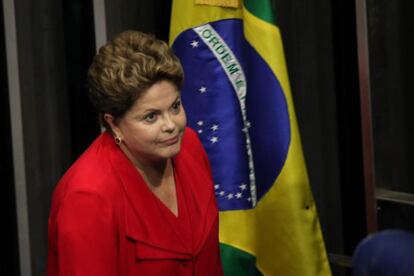Rousseff’s fury over Bolivian fugitive incident
Ambassador prompts presidential ire by comparing senator’s confinement to dictatorship prisons


Brazil President Dilma Rousseff is facing the need for a foreign policy overhaul after Brazilian diplomats in La Paz secretly helped a Bolivian senator escape to Brazil, drawing the ire of Bolivian authorities and criticism from the national media.
After dismissing Foreign Minister Antonio Patriota over the incident, even though he allegedly knew nothing of the affair, Rousseff broke her silence on Tuesday to criticize her ambassador to La Paz, Eduardo Saboia, who had Senator Roger Pinto Molina driven across the border in an official car in the middle of the night. Before that, Pinto Molina had been living inside the Brazilian Embassy for 15 months.
Bolivia considers Pinto Molina a criminal who faces 14 trials for a variety of offenses, including causing losses worth 1.7 million dollars to the state when he was a government official. The Brazilian opposition has long supported Pinto Molina, claiming he is the victim of an attack by the Bolivian government for publicly linking high-ranking officials with the drug trade.
Dilma Rousseff was especially irritated to hear Ambassador Saboia compare the senator’s situation at the embassy with that endured by prisoners during Brazil’s dictatorship (1964-1985). Saboia stated that it made him feel like one of the jailers of the regime.
“The first thing that a democratic, civilized state does is protect its allies,” said a visibly angry Rousseff at a press conference on Tuesday. “We are not in a state of exception. I was there at Doi-Codi [the prison run by the military dictatorship, where Rousseff herself was held between 1970 and 1972] and I know very well what it was like. Doi-Codi is as distant from the Brazilian Embassy in La Paz as heaven is from hell.”
Brazil’s opposition has shown support for the Bolivian senator’s flight to their country, and for Ambassador Saboia, who has threatened to disclose everything he knows about the case.
This is the third incident between Brazil and Bolivia in seven years. Under Lula da Silva, Bolivian President Evo Morales ordered a military invasion of a Petrobrás refinery, which he ultimately nationalized. Two years ago, the airplane carrying Brazil’s defense minister, Celso Amorim, was searched by Bolivian soldiers who were looking for Pinto Molina.
Tu suscripción se está usando en otro dispositivo
¿Quieres añadir otro usuario a tu suscripción?
Si continúas leyendo en este dispositivo, no se podrá leer en el otro.
FlechaTu suscripción se está usando en otro dispositivo y solo puedes acceder a EL PAÍS desde un dispositivo a la vez.
Si quieres compartir tu cuenta, cambia tu suscripción a la modalidad Premium, así podrás añadir otro usuario. Cada uno accederá con su propia cuenta de email, lo que os permitirá personalizar vuestra experiencia en EL PAÍS.
¿Tienes una suscripción de empresa? Accede aquí para contratar más cuentas.
En el caso de no saber quién está usando tu cuenta, te recomendamos cambiar tu contraseña aquí.
Si decides continuar compartiendo tu cuenta, este mensaje se mostrará en tu dispositivo y en el de la otra persona que está usando tu cuenta de forma indefinida, afectando a tu experiencia de lectura. Puedes consultar aquí los términos y condiciones de la suscripción digital.








































